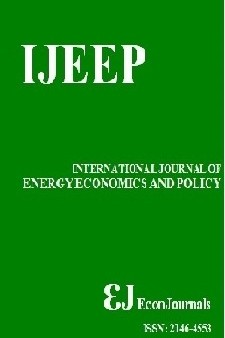A Descriptive Analysis of Public Understanding and Attitudes of Renewable Energy Resources towards Energy Access and Development in Nigeria
A Descriptive Analysis of Public Understanding and Attitudes of Renewable Energy Resources towards Energy Access and Development in Nigeria
- Başlangıç: 2011
- Yayıncı: İlhan ÖZTÜRK
Electricity Demand in a Northern Mexico Metropolitan Economy
Thomas M. FULLERTON, Ericka C. MÉNDEZ-CARRİLLO, Adam G. WALKE
Jomar Patricia De Avila ARROYO, Milton YAGO, Muhammad Ali NASİR, Junjie WU
Oil Price Pass-Through into Domestic Inflation: The Case of Iran
Abbas Ali ABOUNOORİ, Rafik NAZARİAN, Ashkan AMİRİ
Some Evidence on the Asymmetry between Gasoline and Crude Oil Prices in Selected Countries
Raghid FARHAT, Nesreen K. GHADDAR, Kamel GHALİ
Changing Patterns of Electricity Usage in European Manufacturing: A Decomposition Analysis
Yusuf Opeyemi AKİNWALE, İbikunle Olalekan OGUNDARİ, Oluwatosin Eniola ILEVBARE, Adeyemi Oluwaseun ADEPOJU
Mohd Shahidan SHAARİ, Nor Ermawati HUSSAİN, Hussin ABDULLAH, Syahida KAMİL
U.S. Electrical System Reliability: Deregulated Retail Choice States’ Evidence and Market Modeling
